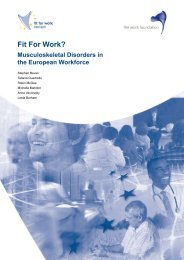FfW Bulgarian report (English language) - Fit for Work Europe
FfW Bulgarian report (English language) - Fit for Work Europe
FfW Bulgarian report (English language) - Fit for Work Europe
You also want an ePaper? Increase the reach of your titles
YUMPU automatically turns print PDFs into web optimized ePapers that Google loves.
5.4<br />
Recommendations<br />
<strong>for</strong> government<br />
Conclusions and recommendations<br />
66<br />
• Encourage self-management. Try to ensure that the patient can adopt strategies to<br />
manage aspects of their own condition, especially if they are staying in or returning to<br />
work. A feeling of empowerment and control will help their mood and ensure that they<br />
can keep on top of important aspects of their incapacity while at work. Collaborate with<br />
patient support groups, which may often provide advice on job retention or return to<br />
work. Consider using specialist psychological support to help patients deal with their<br />
symptoms.<br />
Encourage the focus on the capacity rather than the incapacity of disabled people. Review the<br />
labour codes to ensure that they do not discourage employers from hiring disabled people.<br />
Equally, the welfare system may discourage partially disabled individuals from retaining active<br />
employment status and incentives should be introduced to ensure that those who are able and<br />
willing to work could return to the labour market.<br />
• Consider replacing the current system of sickness certificates with a UK-style ‘<strong>Fit</strong> Note’<br />
(sample presented in Appendix 2) which encourages GPs to indicate what a worker is<br />
still capable of per<strong>for</strong>ming. Focusing on the capacity of the employee would help other<br />
health care professionals and employers to plan return to work interventions and to<br />
make appropriate adjustments to job demands and/or working time.<br />
• Consider a more standardised, joined up approach to recording data about the<br />
prevalence of MSDs, economic costs and societal burden so that data is comparable<br />
across government departments. Prioritise reducing the costs of MSDs <strong>for</strong> individuals<br />
and their families, employers and the labour market. The government should consider<br />
a national plan <strong>for</strong> people with MSDs – driven <strong>for</strong>ward by a National Clinical Director<br />
<strong>for</strong> MSDs – which monitors the improvement in diagnosis and access to appropriate<br />
therapy and vocational rehabilitation in Bulgaria, reducing the societal and economic<br />
burden of MSDs.<br />
• Acknowledge the psychological effects of physical illness that if remain untackled can<br />
perpetuate MSDs. Increase access to psychological support <strong>for</strong> people with MSDs to<br />
enable them to manage the psychological impact of their condition. Occupational health<br />
services that raise awareness of the impact of workplace factors on employee health<br />
need to be equipped with appropriate legislation to pursue the necessary changes in<br />
organisations.<br />
• Expand the definitions of MSDs in the current classification of occupational diseases<br />
beyond their current narrow focus, <strong>for</strong>mally acknowledging that many MSDs and other<br />
chronic conditions (such as rheumatic diseases) are not caused by work, but may<br />
inhibit participation at work.<br />
<strong>Fit</strong> For <strong>Work</strong>?







